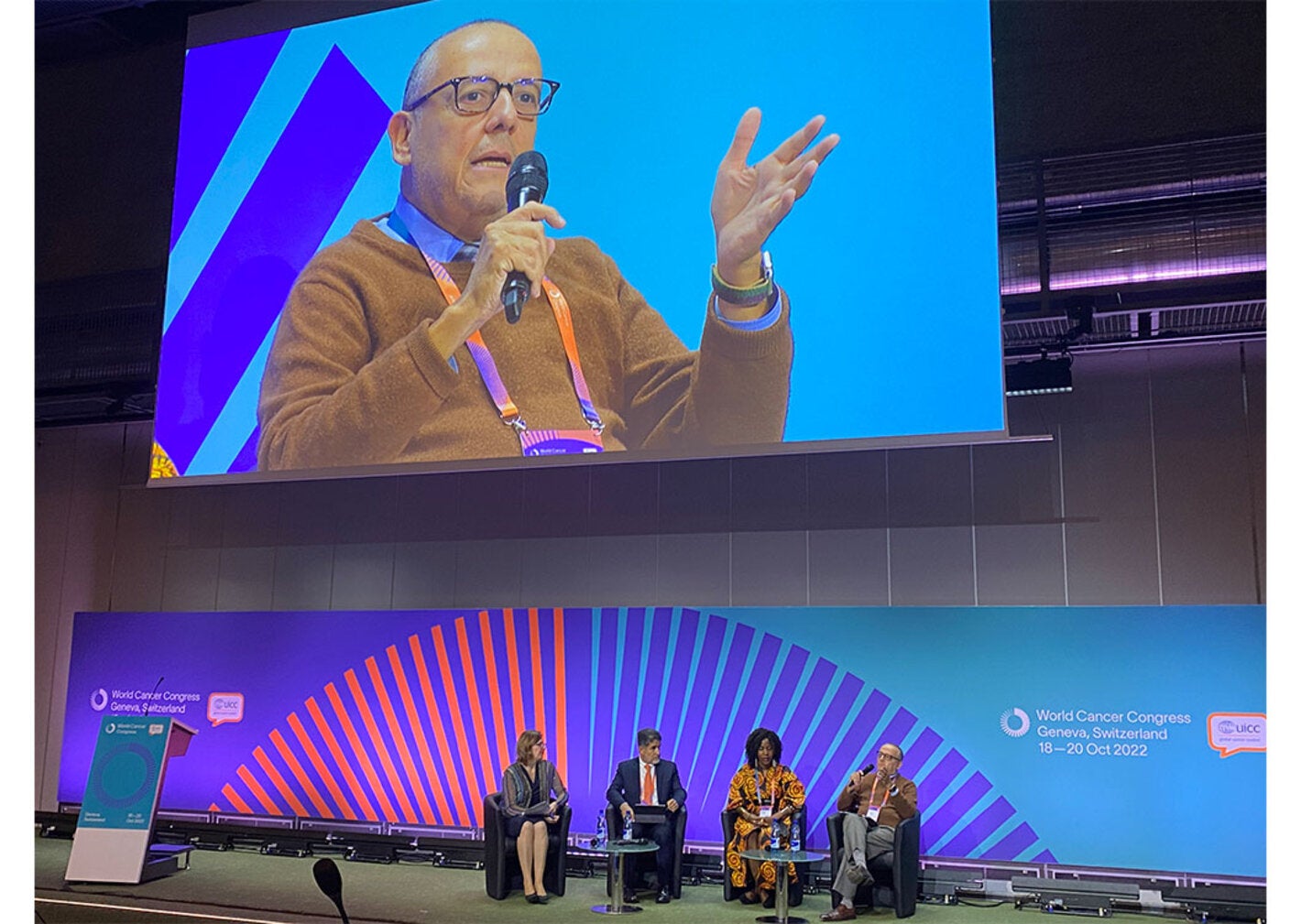
Washington, DC, 19 December 2022 (PAHO/WHO). One of the key targets of the World Cancer Declaration (Target 7) is to improve access to accurate and affordable essential medicines and diagnostics for cancer care. However, many Latin American and Caribbean countries still lack access to these vital health products, despite a high disease burden.
Given this context, the PAHO Strategic Fund attended this year’s World Cancer Congress (WCC) in Geneva. The WCC is a major international health conference where cancer control and health experts convene to exchange ideas and accelerate progress at national, regional, and global levels. During the WCC, the PAHO Strategic Fund had two key objectives. The first was to share the best practices and experiences of the Strategic Fund’s technical cooperation efforts in helping Member States increase access to cancer-related medicines and diagnostics. The second was to advance cancer care across the Americas region by applying successful lessons from previous communicable and noncommunicable disease initiatives.
PAHO was also represented at WCC by Assistant Director Marcos Espinal, who spoke on the need for regional solidarity and planning to improve cancer control, and Regional Advisor for Cancer Prevention and Control Mauricio Maza, who facilitated the Regional Meeting for Latin America. The PAHO Strategic Fund, represented at WCC by Unit Chief Christopher Lim, clearly focus on strengthening Member State capacity to improve affordable and quality-assured medicines and health technologies for cancer.
Through several discussions and meetings, the Strategic Fund highlighted how it continues to leverage technical cooperation to strengthen intersectoral and inter-programmatic work on cancer care with a various partner. This included addressing three panels related to:
1) improving access to essential cancer medicines,
2) implementing multi-state pooled procurement programs, and
3) ensuring the availability of quality-assured treatments for cancer care.
Improving access to essential cancer medicines
Organized by the American Society of Clinical Oncology, this session focused on examining lessons and safeguarding momentum toward integrated strategies for accessible cancer care. Participants discussed how, despite the inclusion of priority cancer medicines in the WHO Essential Medicines List, few of these treatments are widely available in LMICs. In response, Mr. Lim shared how the PAHO Strategic Fund was pioneering ways to make oncology medicines available in the region, including applying successful experiences from tuberculosis and hepatitis C to expand accessible cancer care. In addition, the Strategic Fund highlighted how improved collaboration with key partners, ranging from ministries of health and public health agencies to global organizations like Medicines Patent Pool (MPP) and UNITAID to NGOs like St. Jude Children’s Hospital, is vital to strategic planning and long-term viability for everything from pediatric cancer treatments to breast cancer biosimilars.
Implementing multi-state pooled procurement programs to enhance access to medicines
During the session on leveraging pooled procurement, Mr. Lim showcased how the PAHO Strategic Fund has been able to bridge its technical cooperation expertise with economies of scale to lower prices, improve supply chain management and procurement processes, ensure supplier sustainability, and increase quality assurance. Organized by the Defeat-NCD Partnership, the panel included other speakers, such as from the Organization of Eastern Caribbean States Pharmaceutical Program, who recounted similar lessons -- driving home shared experiences on the unique value of multilateral pooled procurement programs like the Strategic Fund. Given critical gaps, such as the lack of transparent information on quality, prices, and supplier sources, the Strategic Fund showcased innovative solutions for cancer care availability, such as improving demand consolidation practices, strengthening in-country forecasting capacities, and collaborating with policymakers and civil society to increase uptake and investment in cancer-related diagnostic kits.
Increasing access to quality assured and affordable essential medicines for cancer care in low- and middle-income countries
In the wake of COVID-19, disruptions to global health supply chains placed immense strain on health systems, compounding longstanding issues related to quality control and availability of essential cancer medicines and diagnostics. The MPP invited Christopher Lim to discuss the experience of the Strategic Fund in ensuring continuous and equitably accessible cancer care within PAHO Member States. During the session, Lim raised the need to build regional supply resilience across the Americas as a concrete way to safeguard the availability of cancer-related products and expand medicines access programs with pharmaceutical partnerships. In addition, the Strategic Fund emphasized the importance of working through government agencies and PAHO country offices to update national essential medicines lists, explore innovative approaches to voluntary licensing and long-term agreements, and work with quality assurance experts on rational use and standardized treatment protocols. Such initiatives, Mr. Lim emphasized, are best delivered through multilateral pooled procurement mechanisms like the Strategic Fund that can leverage technical cooperation and expertise across countries.
With the UN High-Level Meeting for Universal Health Coverage coming up in 2023, there is a renewed commitment to improving access to essential medicines and supplies for cancer care. Throughout the WCC, the PAHO Strategic Fund showcased its experience leading novel initiatives leveraging technical cooperation on pooled procurement and capabilities demand forecasting and quality assurance capabilities. Despite backsliding of progress for both cancer care and other NCDs, the WCC marked a significant turning point on the collective path toward accessible cancer technologies – and the Strategic Fund will continue to support PAHO Member States on their journey towards universal health coverage.





